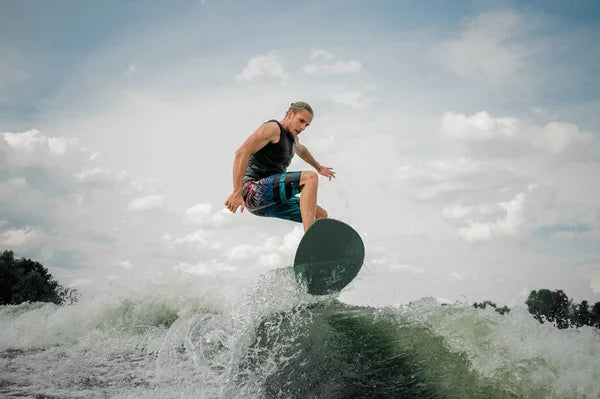The thrill and excitement of being behind a boat skiing, wakeboarding, and tubing is life for many people. It's exhilarating, it's fun! You can enjoy these activities with friends and family soaking up the sun on a warm and beautiful lake day.
In recent years, there has been another water sport that has risen in the ranks of popularity: Wakesurfing! It's a great alternative to traditional surfing while introducing a lot of the fun elements of wake boarding. However, recently wakesurfing has come under some scrutiny and has even been banned in some areas. Let's take a look at why that is.
First off, what is wakesurfing? Wakesurfing is a water sport in which a rider trails behind a boat, riding the boat's wake without being directly pulled by the boat. After getting up on the wake, typically by use of a tow rope, the wakesurfers will drop the rope, and ride the steep face below the wave's peak in a fashion reminiscent of surfing.



You might be thinking, so what's the big deal? And why would it need to be banned? Currently, states like Alabama, South Carolina, Minnesota, and Oregon have banned wakesurfing in specifics areas or certain waterways. While some might think it is being banned because it is dangerous for the wake surfer, in reality this sport is being banned due to the impact it is having on local landscape, shorelines, and the wildlife population.
For example, the Oregon Senate passed a bill that would ban wakesurfing and further limit activities like wakeboarding and waterskiing on the Newberg Pool portion of the Willamette River by a vote almost unanimously 22-1. During a public hearing February 9, patrons said they believed the section of the river is too narrow to allow these activities to take place unimpeded and viewed them as the culprit of receding shorelines and diminishing fish populations.
Alabama State Representative Ginny Shaver has been a vocal critique of wakesurfing. “There’s been a lot of public outcry about the issues concerning wake boats and wakesurfers due to the damage that the wakes cause to lake property, just the nuisance they cause by people who are not considerate of others." she was quoted as saying. “The proximity and the areas closest to the shoreline, that’s where the damage is going to happen, and so that’s why the proximity is the measure,” Shaver explained. The Alabama Senate passed Bill 281 by a vote of 26-0 with nine abstentions. It also passed the House Public Safety and Homeland Security Committee with one amendment. The full language of the bill can be found here.
The new law in South Carolina states that no person may wakesurf on all state waters within 200 feet of a dock, a person in the water, or an anchored water craft. Wildlife officials say violation of the law is a misdemeanor punishable by fines between $100 and $600, depending on county court fees.
Additionally, Minnesota locals battles over whether the activity should be restricted because of damage it can cause to shorelines, property and fish habitat. An environmental committee in the Republican-led Senate approved a bill aimed at keeping wakesurfing — in which boats create waves big enough for people to surf without the need of a tow rope — 200 feet from shore, docks, swimmers and other boats.
In conclusion, be mindful of where you are boating and the wakesurfing laws that exist as this is a growing concern and may spread to other states. If you are a wakesurfer, try and avoid narrow waterways and move further away from shore to limit the wake hitting the shoreline.
(Remember to inspect your boat lines and dock ties and replace as needed. Boat lines and dock ties weather and weaken over time.)

